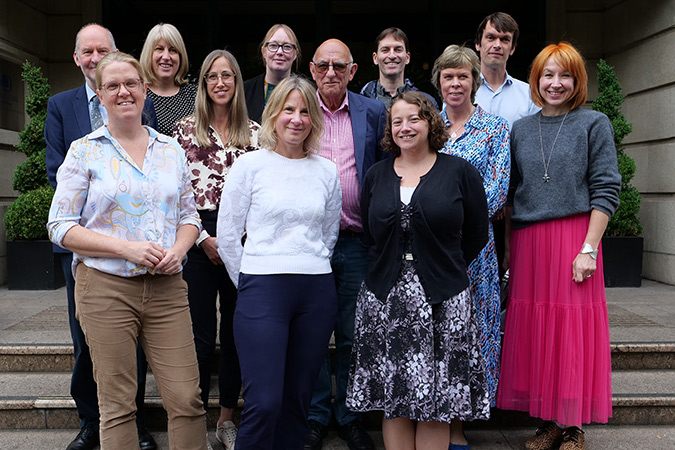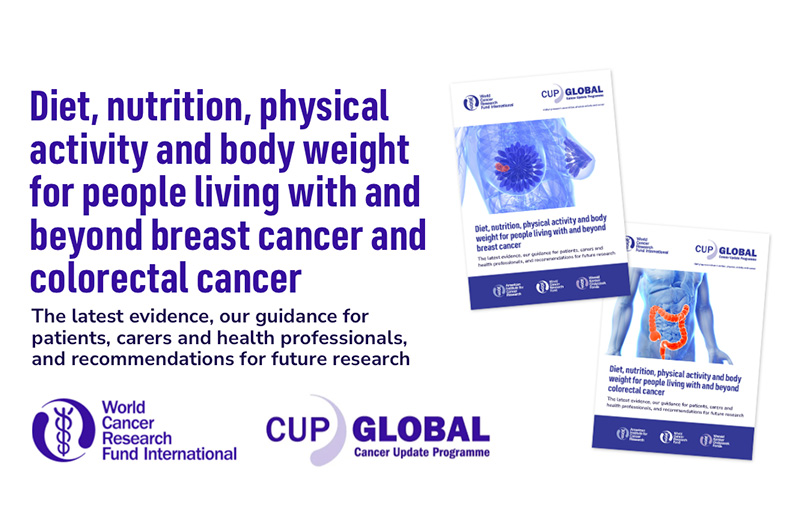After a cancer diagnosis, follow our Recommendations, if you can
Check with your health professional to see if following our Recommendations is right for you

On this page
Overview of evidence
The available evidence on the effect of diet, nutrition, and physical activity on the risk of cancer in cancer survivors is limited. There is a lack of evidence from randomised controlled trials.
In addition, most published observational studies do not adequately account for factors such as cancer subtypes, type and intensity of treatment, or the presence of other illnesses.
Further research is needed to better understand the impact of diet, nutrition, physical activity, and bodyweight upon the health of those living with and beyond a diagnosis of cancer.
The results of this research will then enable WCRF to developmore specific evidence-based recommendations for cancer survivors.
Goal
- All cancer survivors should receive care and guidance from trained professionals about nutrition and physical activity.
Unless otherwise advised, and if you can, all cancer survivors are advised to follow the Cancer Prevention Recommendations as far as possible after the acute stage of treatment.
Cancer survivors are people who are living with and beyond a diagnosis of cancer. This includes those currently living with the disease and those who have recovered from it.
Evidence
Research on the effects of diet, nutrition and physical activity on health outcomes (including the risk of a future cancer and recurrence) in cancer survivors is growing. However, to date the Panel has reviewed the evidence for the effects of these lifestyle factors only in survivors of breast cancer.
The Panel made its recommendation based on its examination of the available evidence on breast cancer survivors and on its collective knowledge of the biology of cancer and its interactions with diet, nutrition, physical activity and body weight.
The Panel agrees that the conclusions underpinning the Cancer Prevention Recommendations are also likely to be relevant to cancer survivors.
What we mean by limited evidence
When we refer to limited evidence in this context it means the available evidence may be limited by the amount of evidence in terms of the number of studies available, by inconsistency of direction of effect, by methodological flaws (for example, lack of adjustment for known confounders) or by any combination of these factors.
Quality of life and fatigue in people living with and beyond colorectal cancer
Complementing our two reports, this review completes the CUP Global work on living with and beyond cancer, reporting outcomes relating to quality of life and fatigue following a colorectal cancer diagnosis.
The CUP Global team at Imperial College London, investigated whether physical activity, sedentary behaviour, diet, body fatness and body composition impact/change/influence health-related quality of life and cancer-related fatigue (referred to here as ‘quality of life’ and ‘fatigue’) in people after a diagnosis of colorectal cancer.
They found 30 trials and 13 cohort studies, most from North America and Europe. Our independent CUP Global Panel of Experts judged this evidence using pre-defined grading criteria. Overall, the results showed little evidence for physical activity, sedentary behaviour, diet, body fatness or body composition influencing quality of life or fatigue in this group.
It’s important to better understand how physical activity, sedentary behaviour, diet, body fatness and body composition influence quality of life and fatigue in people living with and beyond colorectal cancer.
Improvements in study quality, along with broadening the populations studied, would allow us to better understand how to support the wellbeing of people living with and beyond colorectal cancer.
Additional information
The circumstances of cancer survivors vary greatly. There is increased recognition of the importance of diet, nutrition, physical activity, and body weight in cancer survival. People who have been diagnosed with cancer should be given the opportunity, as soon as possible, to consult an appropriately trained health professional, who can take into account each person’s circumstances.
People who are undergoing treatment for cancer are likely to have special nutritional requirements. This is also true for following treatment, when a person’s ability to consume or metabolise food may have been altered, as well as people in the later stages of cancer whose immediate need is to arrest or slow down weight loss.
These are all clinical situations where the advice of an appropriately trained health professional is essential. Unless specifically advised by an appropriately trained professional, the evidence does not support the use of supplements as a means of improving survival.
There is growing evidence that physical activity and other measures that control weight may help to improve survival and health-related quality of life after a breast cancer diagnosis. Cancer survivors are also likely to gain health benefits related to other conditions, as well as a sense of control, from regular physical activity at levels that they can sustain.
Implications for other diseases
Evidence shows that following a dietary pattern close to our Cancer Prevention Recommendations is likely to help prevent other non-communicable diseases (NCDs), including cardiovascular disease and type 2 diabetes, and help management and control of co-existing NCDs, which can complicate cancer treatment and reduce survival.
Public health / policy implications
A comprehensive whole-of-government, whole of-society approach is necessary to create environments for cancer survivors that are conducive to following our Cancer Prevention Recommendations. Our Policy blueprint for cancer prevention and Living with and beyond cancer factsheet outline the range of policies that are needed to support people living with and after a diagnosis.
More resources
Download and read chapters from our 2018 Third Expert Report.

Experts we work with
We collaborate with world-renowned experts to assess every aspect of CUP Global
